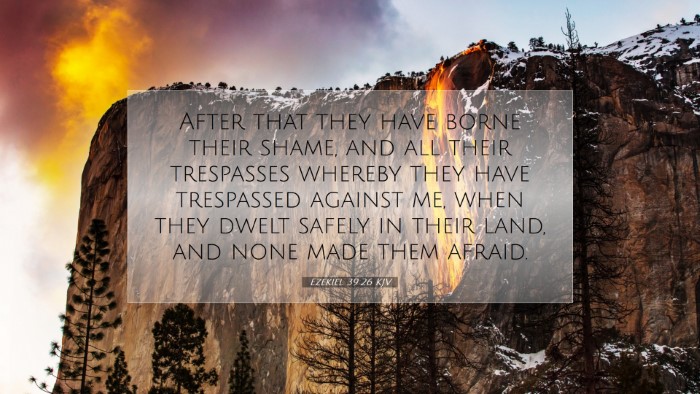Bible Commentary on Ezekiel 39:26
Ezekiel 39:26 (NIV): "They will bear their shame and all their unfaithfulness they showed toward me when they lived in safety in their land, untroubled by the fear of harm."
Contextual Overview
The book of Ezekiel, written by the prophet Ezekiel during the Babylonian exile, addresses the themes of judgment and restoration. Chapter 39 concludes a prophecy against Gog, symbolizing the forces of evil. After God’s intervention, there is a notable shift from destruction to restoration, serving as a reminder for Israel's need for humility and repentance.
Expository Insights
Thematic elements in Ezekiel 39:26 emphasize the following:
- Divine Judgment: The verse highlights the consequences of unfaithfulness to God, illustrating how the people's past actions are brought to light as they confront their shame.
- Historical Context: At this moment in Israel's history, the people had indulged in complacency, thinking they were secure while turning away from God. Their unfaithfulness had enduring repercussions.
- Restoration and Repentance: This shame is not merely punitive but serves to awaken a deeper sense of need for restoration, pointing toward a future where God will bring healing and renewal.
Matthew Henry's Commentary
Matthew Henry elaborates on the existential implications of experiencing shame. He notes that this shame is indicative of a realization of their unfaithfulness—a necessary step for true repentance.
Henry emphasizes the need for believers to recognize their faults and shortcomings before God, as it leads to acknowledgment of God’s mercy and grace. Thus, the experience of shame, while uncomfortable, can be a prelude to healing and restoration.
Albert Barnes' Observations
Albert Barnes provides a more detailed analysis of the term "unfaithfulness." He identifies this as a betrayal not just of a covenant but also of personal relationship with God. The historical context suggests these breaches were marked by idolatry and neglect of the Law.
Barnes highlights that the return to God requires an honest recognition of these breaches, which can be painful but is essential for any hope of restoration. The shame they bear is a reminder of their covenant obligation and the grace they must seek from God.
Adam Clarke's Commentary
Adam Clarke focuses on the significance of living "in safety" and the false sense of security that the Israelites had. Clarke argues that complacency can be as dangerous as outright rebellion, leading to a neglect of spiritual duty.
According to Clarke, the shame mentioned is a key step for renewal. Without understanding the gravity of their past failures, the people could not understand the depth of their need for God. Clarke offers insight on how acknowledging shame can be a precursor to the joy of forgiveness.
Theological Reflections
This verse holds rich theological implications for understanding human nature in light of divine expectation. The shame felt by the people serves to reflect God’s righteousness. The recognition of unfaithfulness reiterates the need for a deep, personal relationship with God characterized by fidelity and love.
Lessons for Contemporary Believers
- Humility Before God: Just as Israel was called to recognize their shortcomings, modern believers are invited to approach God with an attitude of humility, recognizing the need for His grace.
- Understanding Sin and Its Effects: This passage serves as a reminder that unrepentant sin can lead to separation from God. Believers must remain vigilant in their faith journeys.
- Hope in Restoration: Despite the weight of shame, the overarching narrative of Scripture presents God as a redeemer. Believers are encouraged to find hope through the acknowledgment of their failings.
Conclusion
Ezekiel 39:26 captures a pivotal moment in the dialogue between God and His people. It emphasizes the need for recognition of unfaithfulness so that true restoration can occur. The insights gathered from the commentaries of Matthew Henry, Albert Barnes, and Adam Clarke provide profound implications for understanding this verse's message about human nature, divine grace, and fulfilling the covenantal relationship with God.


